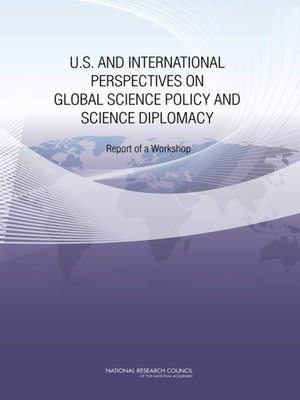U.S. and International Perspectives on Global Science Policy and Science Diplomacy
ebook ∣ Report of a Workshop
By National Research Council

Sign up to save your library
With an OverDrive account, you can save your favorite libraries for at-a-glance information about availability. Find out more about OverDrive accounts.
Find this title in Libby, the library reading app by OverDrive.



Search for a digital library with this title
Title found at these libraries:
| Loading... |
<p>The United States and other countries around the world face problems of an increasingly global nature that often require major contributions from science and engineering that one nation alone cannot provide. The advance of science and engineering is an increasingly global enterprise, and in many areas there is a natural commonality of interest among practitioners from diverse cultures. In response to challenges, the National Academies held a workshop in Washington, DC, in February 2011, to assess effective ways to meet international challenges through sound science policy and science diplomacy.<br>
<em><br>
U.S. and International Perspectives on Global Science Policy and Science Diplomacy</em> summarizes issues addressed during this workshop. Participants discussed many of the characteristics of science, such as its common language and methods; the open, self-correcting nature of research; the universality of the most important questions; and its respect for evidence. These common aspects not only make science inherently international but also give science special capacities in advancing communication and cooperation. Many workshop participants pointed out that, while advancing global science and science diplomacy are distinct, they are complementary, and making them each more effective often involves similar measures. Some participants suggested it may sometimes be more accurate to use the term <em>global science cooperation</em> rather than <em>science diplomacy</em>. Other participants indicated that <em>science diplomacy</em> is, in many situations, a clear and useful concept, recounting remarkable historical cases of the effective use of international scientific cooperation in building positive governmental relationships and dealing with sensitive and urgent problems.<br>
<br>
To gain U.S. and international perspectives on these issues, representatives from Brazil, Bangladesh, Egypt, Germany, Jamaica, Kazakhstan, Malaysia, Morocco, Rwanda, South Africa, and Syria attended the workshop, as well as two of the most recently named U.S. science envoys, Rita Colwell and Gebisa Ejeta.<br></p>






